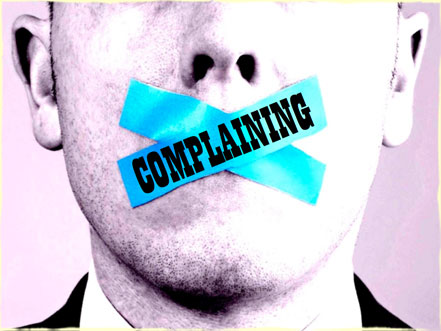Complaining — which we all do from time-to-time, if not daily — can apparently physically hurt your brain if you’re doing it too much. Beyond that depressing research, there’s this notion: when you complain, your bloodstream is flooded with cortisol (the stress hormone); on average, people take a story they complain about and tell it to 8-16 other people. You probably say — I know I have — that the idea is to “get something off your chest,” but in reality it just makes you angry, upset, and stressed out all over again. It’s not inherently beneficial.
Guy Winch wrote a book called The Squeaky Wheel and argues that, as a society, we complain too much and we don’t complain effectively at all. He talked to Fast Company about some of this; below are a couple of thoughts from him and me and other Internet sources, intertwined.
How To Think About Complaining
You need to complain basically with two things in mind:
- Is this doing anything to resolve the issue?
- Is it structured the right way?
In terms of “anything to resolve,” that means, “Am I complaining at the right people?” If your boss is pissing you off by sticking politically to a new company mandate that you see a ton of flaws in, complaining to your peers — or other members of the rank-and-file — won’t do you any good. You actually need to talk to your boss about it, and be open/transparent. This is extremely hard for people, especially in a work context. We’re taught from a young age that the “big idea” around work is do your job, respect your elders/bosses, and wait for your turn to excel. That’s been bucked a little bit by the millennial generation and the tech boom, sure, but by and large in most industries, people still look at work that way. Taking a complaint / negative idea / view of the company that isn’t 100 percent bought-in to a supervisor can be scary. But still, complaining to the woman in the next cubicle ultimately does nothing except stress you out.
In terms of “structured the right way,” the idea is a complaint sandwich:
- Open with something positive.
- Put the complaint here.
- Close with something positive.
This has been a common approach to meetings, conflict resolution, parent-teacher conferences, and all the rest for most of the last 30-40 years, I’d argue. Marriages are literally built uponst the rocks of the complaint sandwich. (“I really love when you _____, but I wish you would _____, even though I really respect that you _____”). It’s actually typically called a compliment sandwich, but I skewed it for this post. Sue me.
As with everything in the modern business environment, be concise and brief.
Complaining As A Social Good
Complaining can create solidarity among people who don’t know each other — think of how you make friends while waiting for airplanes. They delay the plane, and everyone bitches. That creates bonds. You probably don’t know 3/4 or 4/5 of the people there, but for 2 hours while you’re waiting for your flight, you’re now friends. Research has shown this.
The thing is, you can achieve the same type of solidarity — and do it in a way that’s better for your health — if you open with a positive idea instead of a negative one. For example: rather than “OMFG, this plane is delayed?” you could roll with “Well, at least I have some time to finish up Serial now.” It’s possible no one in the lounge will know what Serial is, but that’s a variation on the theme of “catching more flies with honey,” etc.
Speaking Frankly
There is a human tendency sometimes to not want to offend — thus to be afraid of speaking frankly with someone that bothers us (or is above us in a hierarchy) and/or to be afraid of talking about failure and loss as a general idea. Give all that up. The more you couch how you really feel in uppity complaints to people who can’t actually do anything about it, the worse you’ll feel; rather, just speak frankly and directly and transparently and buzzword of your choice here to the person that bothered you. That’s the easiest way.
People have gone 21 days without complaining — using some of the above techniques instead — and reported that it changed their life.
There’s also something contextual here about “embracing an imperfect world,” and/or understanding that many things really aren’t in your ability to change.
How do you try to manage/stop complaining in your own life?
